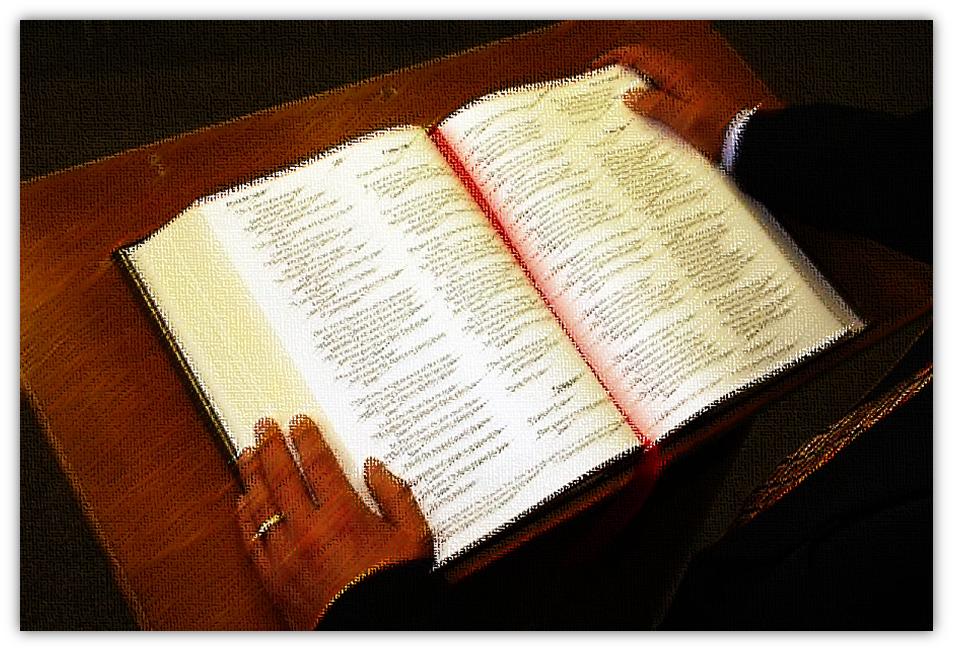What Is Preaching?
What Is Preaching?

There are in our churches today concerns also about the preaching. Do we still understand what preaching actually is? It has struck me that in more than one church building, the old pulpit has been replaced by a simple lectern. This development is likely motivated by the idea of bringing the preacher closer to the congregation. One cannot complain about that. But perhaps there are also other ideas at work.
It’s possible that behind this development there hides a vision of preaching with which I am less impressed. I mean the notion whereby the sermon is thought of as a kind of Bible reading, a speech by a brother who studied for it, to demonstrate to us what the Word says.
In my view that notion is not correct. Preaching is formal work. The preacher stands on the pulpit as an office-bearer, one called to proclaim the Word of God to the congregation. He is an “ambassador of Christ” (2 Cor. 5:20 NIV) through whom God makes us hear his call. To him is entrusted—per the Form for the Ordination of Ministers of the Word—“the ministry of reconciliation.”
Thus, the sermon is more than a journeying together in coming to understand a Bible text, or a congregational reflection; it is a formal proclamation resounding to the congregation in the name of Christ. Sent by him, the preacher speaks; thus, the latter’s message is authoritative. Calvin writes, “In the preaching we need to hear the pronouncements of God himself, proclaimed from the highest tribunal, written in the Book of Life, confirmed in heaven, sure and certain” (Institutes, IV.11.1).
Timothy received the commission: “Preach the Word!” (2 Tim. 4:2). The churches of the Reformation saw this as a permanent task, which they entrusted to brothers whom they approved as capable following examination by the churches and congregational approbation.
The Key on the Pulpit⤒🔗
We hear about the deep seriousness of the minister’s work on the pulpit in Lord’s Day 31 of the Heidelberg Catechism, which deals with the keys of the kingdom of heaven. The first key is “the preaching of the holy gospel.” If the priest of Rome exercised the power of this key in the confessional, the Reformation put the key on the pulpit. It is there where the key’s power is delivered, there where the kingdom is opened to the believer and closed to the one who does not love the Lord Jesus. The “proclaimed and publicly testified” of answer 84 (of the Heidelberg Catechism) typifies the public character of the preaching. God’s voice does not resound in the darkness of the confessional, but from the pulpit, in public, freeing and warning all those present in the church.
Reconciliation is “served”: proclaimed and publicly declared to believers that there is forgiveness for them through Christ’s blood. For them the kingdom of heaven is opened.
But at the same time the opposite also occurs: that kingdom is also closed to all unbelievers and hypocrites. They are told that God’s anger and eternal judgment rests on them as long as they do not convert.
Thus, according to our own confession, preaching is not just a congregational journey of discovery regarding a particular text, or a speech concerning a biblical theme, but consists of delivering the power of the key to the kingdom of heaven, which Christ bestowed on his congregation via his apostles (Matt. 16:18-19; John 20:21-23).
Troubled brothers and sisters complain that there is too little treatment of, especially, the closing power of the key in the sermons they hear. If this is indeed true, church councils need to pay close attention to this matter in sermon discussions. For the calling of the one who serves the Word is also to highlight eternal punishment; to close the kingdom of heaven to all who do not believe.

I have noticed how seldom I hear preachers say at the beginning of a sermon: I serve you God’s Word concerning this text. I lament that, for to my mind it is precisely that pronouncement that reminds the congregation that the sermon is more than a Bible reading; that it is a formal proclamation and that the preacher—even as he preaches to himself as well—stands, at that moment, as Christ’s envoy opposite the congregation to bring the message of the One who sent him. A message that can sometimes be at great odds with what a congregation thinks and feels!
“The Whole Will of God”←⤒🔗
In his book Body and Spirit of Christ (2012), Professor Bram van de Beek notes that in most church denominations only a selection of Bible portions are discussed in the preaching, and that certain aspects of the faith are ignored or even denied. I hope that this is not the case in our churches. But I am not entirely at ease when I hear that in different churches, the regular preaching of the catechism is becoming a problem. It is precisely this regular preaching that keeps us from one-sidedness and ensures that all sound doctrine is addressed.
Today’s people do not like to hear about God’s eternal judgment and his anger; they would rather hear about God’s love and nearness, which console and encourage like a warm blanket. He is the One you can go to with your problems and loneliness. Therapeutic sermons are consumed like cake.
But the minister is called, following the example of Paul, to proclaim “the whole counsel of God” (Acts 20:27). That is another sort of cake. He is not allowed to keep silent about our deep lostness, our daily sins, or about God’s anger and how we need the reconciling blood of the Lord Jesus every day. The whole of the Word should be tabled in the preaching, whether the congregation likes it or not! Thus the message of absolution in Jesus Christ for poor sinners constitutes the heart of reformed preaching.
In essence, what a congregation might feel is not decisive. The minister needs to understand his calling: as an ambassador of Christ, to proclaim the whole will of God, and being faithful to what the apostle Paul did. He needs to keep in mind what the Lord said to Ezekiel: “You shall speak my words to them, whether they hear or refuse to hear” (Ezek. 2:7). Our church councils should honour this when the issue of sermon discussion is under consideration. They carry the responsibility that in and through the preaching, the congregation is truly built up.
“Brave” Praying←⤒🔗
Thus far I have addressed what preaching is and what the minister needs to do. It has struck me how Paul asked the congregation for their prayers precisely regarding his preaching. When even an apostle is asking for intercessory prayer from the congregation, how much do our servants of the Word need the prayers of the congregation! Paul writes, “Pray also for me, that whenever I open my mouth, words may be given me so that I will fearlessly make known” (Eph. 6:19 NIV)—showing the extent to which preachers ought to be carried by the prayers of the congregation. “Fearless words” need to be given. The minister needs the guidance of the Holy Spirit in saying that which the congregation stands in need of, and to say it in a way that his listeners hear it.

But what about our intercessory prayers for the minister who needs to go up on the pulpit each Sunday? Do we pray for him, that he may find the words and that his sermon may truly touch us? We want catchy preaching and we want to be personally addressed on Sundays. If, according to our estimation, that is missing, we have our criticisms. But are we intercessors for those who need to proclaim the Word and who serve the power of the key to the kingdom of heaven?
It would be good if elders on their home visits would also ask this question. Because faithful preaching is a gift which the Lord requires us to pray for.
Precisely in this day and age, now that people are more empowered and critical and make their own choices, it has not become easier for preachers to find “fearless words.” To cite Luther, that is why there will need to be “brave praying,” should we want a truly prophetic voice on the pulpit: a word in due season. For this our ministers need the guidance of the Holy Spirit, which God gives to those who pray and thank him for it without ceasing (Heidelberg Catechism, answer 116)!

Add new comment